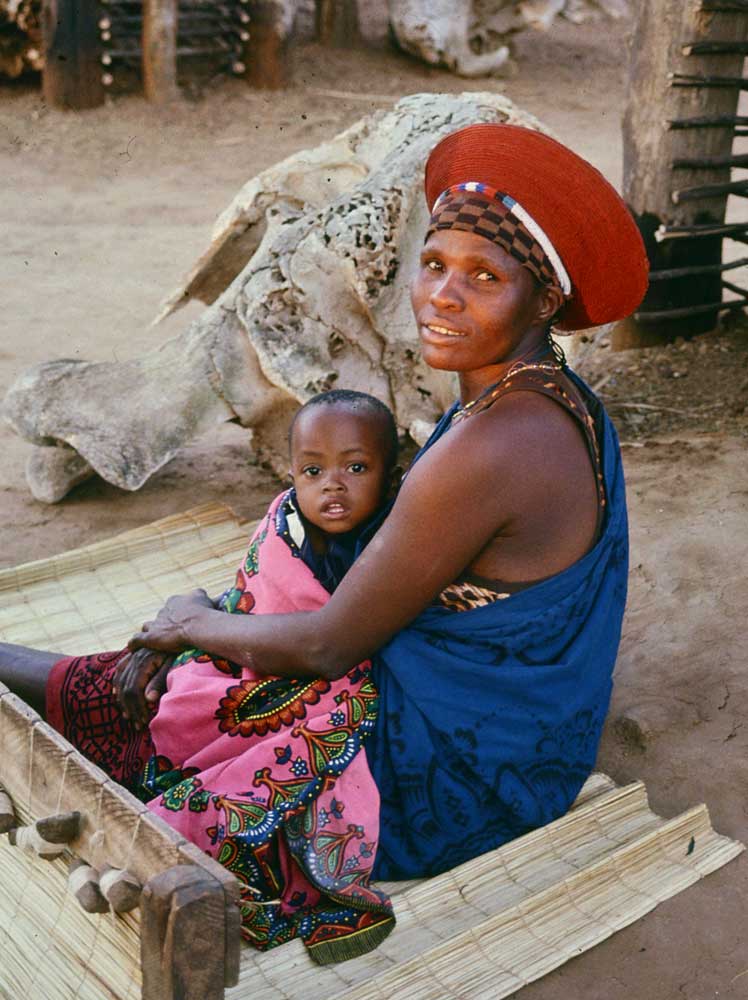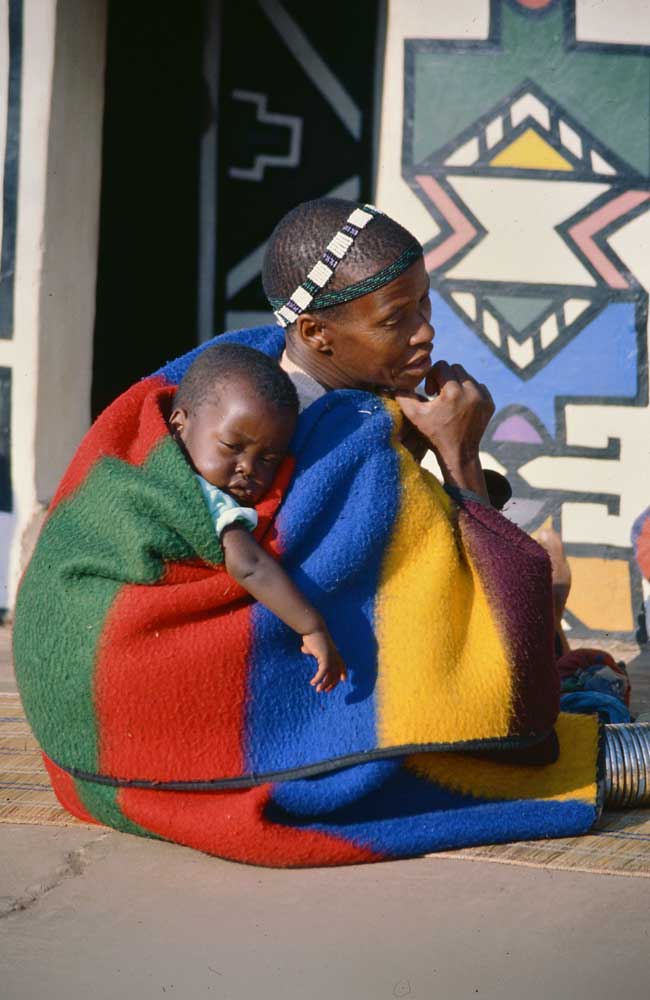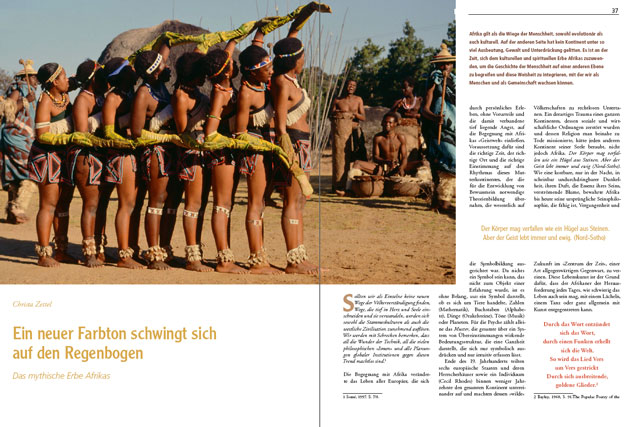14 Jun The rainbow has a new color
Autor: Christa Zettel
Kategorie: Schamanismus
Ausgabe Nr: 82
Dies ist die englische Übersetzung eines ursprünglich auf Deutsch erschienenen Beitrags. Klick hier, um ihn auf Deutsch zu lesen!
On one hand, Africa is considered the cradle of humanity both evolutionarily and culturally, on the other hand, no other continent has suffered so much exploitation, violence and oppression. It is time to turn to Africa’s cultural and spiritual heritage in order to understand the history of humanity on a different level and to integrate this early, mythical wisdom in order to grow as individuals and as a community.
If we as individuals do not find new ways of understanding among all nations, ways that penetrate deeply into our hearts and souls and transform them, then both tribal cultures and western civilizations will increasingly disintegrate. We will realize with horror that all the miracles of technology, all the many philosophical “isms”, and all the planning of global institutions are powerless against this trend..
The encounter with African culture changed the lives of those Europeans who, through personal experience, without prejudice and the deep-rooted fear associated with it, embraced the encounter with Africa’s “spirit world”. The prerequisites for this are the right time, the right place and the right attunement to the rhythm of this mother continent, which led to the formation of the theories necessary for the development of consciousness, which was essentially oriented towards the formation of symbols.
At the end of the 19th century, six European countries and their rulers, as well as one individual (Cecil Rhodes) divided the entire continent among themselves within a few decades and turned its “wild” peoples into subjects without rights. The trauma of an entire continent, whose social and economic orders were destroyed, and whose religion was almost missionized to death, would have robbed any other continent of its soul, but not Africa.
The body may have fallen like a hill of stones. But the spirit lives forever and ever (North-Sotho).
Nothing is more magical than the voice of African “storytellers”, their face reflecting a halo of dancing flames as they speak the ancient words handed down over thousands of years: „INDABA!“ (Come together and listen).

The history of the first xylophone
When Malinge, a Wakambi boy invents a trap that leads to the cruel death of a pregnant female ibex, Marimba, the goddess of music and dance reminds the young trapper of the “seven sacred laws” of the Wakimbi. Malinge did not kill out of hunger, which is allowed, but out of “the lust for invention”. By doing so, he violated the taboo stemming from the downfall of the first „race who died“, stating that man must not invent more than he needs to survive.
Marimba demands that Malinge should bring the young ibex back to life, which of course does not succeed.
Man can take life, but this is where his power ends.
To give life that has been taken is impossible for him. To restore the balance, Malinge himself must die. Marimba, however, takes the deadly trap, changes some things here and there, and from the deadly device the first xylophone is created, which is still called a marimba today.
If you want to learn more about Malinge and the Wakambi, you can order and download the full article as a pdf below.
Warning by Karen Blixen (Film „Out of Africa“)
Karen Blixen, who lost her heart in „Out of Africa“, warned that if we continue to blind the African with our way of life long enough, we may eventually awaken in him a desire for darkness that may drive him into the abyss of his own unknown depths and his own unknown soul. Today this is mainly the case north of the equator, where the cultural and spiritual uprootedness is already blossoming at a horrific rate.
»The African suffers, struggles, rebels, seeks new ways, but he has no neurosis.«
Turning psychological forces against people and nature is considered the greatest crime of all in Black Africa.
This also applies to the written and especially the spoken word, which is why Africans prefer to listen rather than to talk. What is true of the dreaded black magician of myths, is also true of the use of a powerful intellect that emphasizes exclusively intellectual logic and the analytical, causalistic attitude of the mind. Whether consciously or unconsciously, “He who has blood on his hands cannot walk far.” (North-Sotho)
Much more about the soul of Africa can be read in the full article. It is available as a Pdf, which can be ordered below. 😉
The agreement with the African way of thinking, which surprises Europeans, is based on Africa’s primal symbolism. And because every language is the final result of a process of symbolisation, the Bantu languages of black Africa provide information about the philosophy of being that underlies their history.
The word Bantu, which is frowned upon today, means “the people”. The essential difference with Indo-European languages is that nouns are not separated by grammatical gender into masculine, feminine and neuter, but are divided according to species into four “categories of being”: 1. munto: human being; 2. kintu: thing; 3. hantu: place and time, 4. kunto: modality.

What is common to all, despite the confusing diversity of African tribal languages, is the word root N’tu which occurs in every appearance or form of „to be“. It does not refer to the effect of being, not to being (our idea of being), but to the transcendent BEING itself (actually non-being as per Fu Hsi the zero at the beginning). The fact that N’tu never occurs alone, although it is inherent in all manifestations, including time and space and the way of being or thinking (modality), has the advantage that it cannot be worshipped. Thus Bantu languages are an impressive testimony
»from one of the strongest transcendental early cultures on earth – here transcendence, dealing with the other world, is not a phrase but a reality«.
As the shadow of the “devourer of all things” begins to cast over the world, Dxuie, the prototype of the Khoi-San’s life, realizes that something in him has gone wrong. He offers himself as a victim. As a consequence of the self-inflicted demise of the race that died, people choose to live in harmony with the rhythms of nature and the cosmos.
In man dwells not only a potential destroyer, but also a potential creator, a “great Munto”, a man in his entirety, who has ceased to experience opposites as contradictions – for this is what generates destructive power.
Nommo, the ``magic power of the word``, life itself, is capable of transforming itself into that power that gives new life, both physical and spiritual.
These are excerpts from the article.
Read the complete version with references and detailed bibliography in Tattva Viveka 82 or download this article individually as an ePaper in German language for 2,00 € (Pdf, 11 pages).

[wpshopgermany product=”583″ template=”beschreibung.phtml”]

About the author
Christa Zettel, born in Vienna, is a journalist and author. Since spending several years in South Africa, she has devoted herself to myth research. In her books she draws attention to the great importance of myths for our time: www.christazettel.com
More articles on similar topics
- TV 59: Dr. phil. Heinke Sudhoff – Adams Ahnen.
Das Licht der alten Kulturen im Licht moderner Wissenschaft - TV 52: Astrid Gutowski – Mystik und Mythos. Wenn das Unsagbare zur Sprache kommt.
Was uns die alten Götter noch zu sagen haben - TV 52: Clemens Zerling – Die Entstehung von Ton und Wort aus dem Stein.
Idee und Nachwirkungen des indoarischen Mythos vom steinernen Himmel - TV 45 + 46: Prof. Dr. Peter Hubral – Logos und Mythos.
Ursprung und Untergang der Philosophia, Teil 1 + 2 - TV 44: Andreas Wenath – Der Heilige Gral. Nur ein Mythos der Christenheit?
- TV 23: Farah Lenser – Andere Wirklichkeiten.
Bericht vom 5. Kongreß für Schamanismus und Heilen (Mondsee, 2004) - TV 17: Prof. Bernhard Lietaer – Schwarze Madonnen.
Ein Archetypus wird wiederentdeckt
© Alle Bilder: Christa Zettel




Keine Kommentare